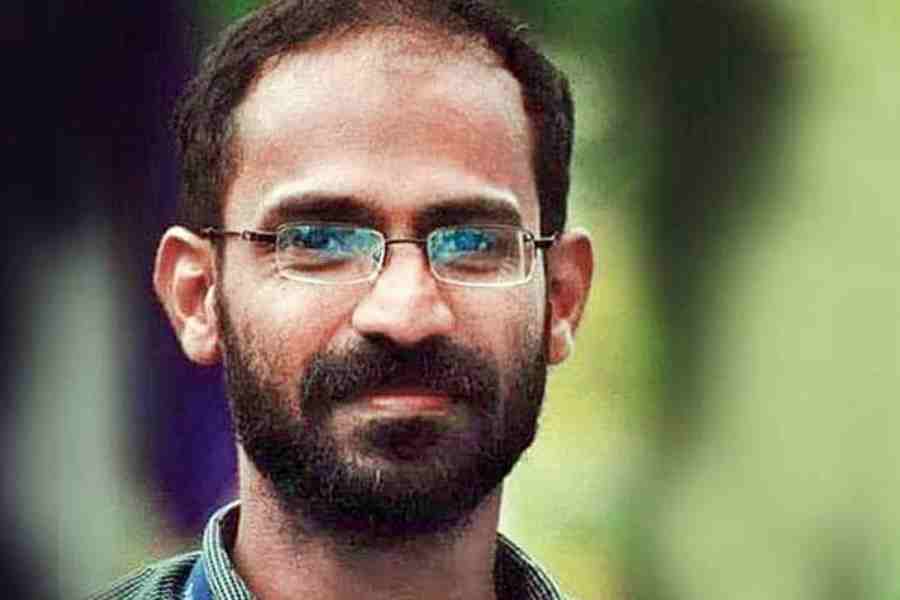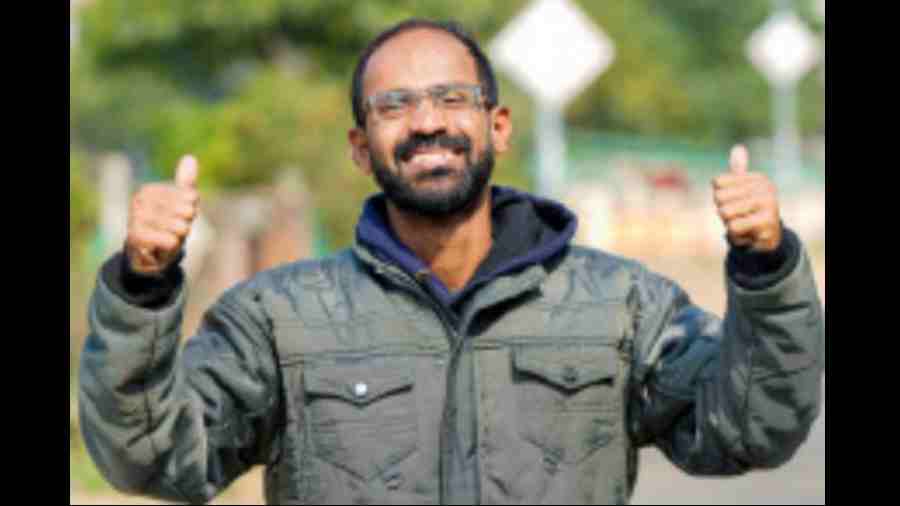Memory is the biggest weapon against fascism, a journalist who spent more than two years in Uttar Pradesh jails without trial told a Calcutta audience on Sunday.
“Don’t forget anything. One tool works best against fascism: it is memory. We must remember everything that has happened to us,” Siddique Kappan said in his first public interaction outside his home state of Kerala since walking out on bail on February 2 this year.
Kappan had spent 28 months behind bars after being detained near Mathura while travelling to Hathras to report on the alleged gang rape and murder of a Dalit teen. He was accused of planning to foment social unrest and violence, and booked for terror and sedition. He denies all the charges.
On Sunday, Kappan recounted the days of confinement, starting with the questions he had allegedly faced from police and other agencies after being detained on October 5, 2020.
“How many times have you visited Pakistan? Do you eat beef? Do you know Urdu and Arabic? Are you from JNU?” Kappan recalled being asked.
“I told them I never went beyond Punjab and that I eat beef, pork and a variety of other meats. That I know a bit of Urdu and I flunked an entrance test to JNU.”
After his arrest, Kappan spent 21 days at a Mathura school that was turned into a temporary jail and quarantine centre. But there were “50 other people cramped into the same room”.
He said he got a chance to make his first phone call after 45 days of confinement.
“I was given five minutes and told I could speak either in Hindi or English. After I pleaded that my 90-year-old mother understood only Malayalam, I was given two minutes to talk in my mother tongue,” Kappan said.
Kappan was also booked by the Enforcement Directorate for alleged money laundering. “The ED case was based on Rs 5,000 credited to an account of a friend,” he said.
He said he had got interested in the Hathras case because of the way the Dalit teen was cremated. Police had allegedly hijacked the body from a Delhi hospital and burnt it at her village in the dead of night while keeping her immediate family out.
On March 3, a court cleared three of the accused of all charges while convicting the fourth of culpable homicide not amounting to murder. The court said there was no evidence of rape.
In her dying statement, the teen had named all the four accused and said they had gang-raped and attacked her. The verdict has been challenged in high court.
When he was arrested, Kappan was secretary of the Delhi unit of the Kerala Union of Working Journalists, which had organised a series of anti-BJP-RSS protests on issues ranging from the 2020 Delhi riots to the murder of journalist Gauri Lankesh in Bangalore.
“I was under the surveillance of the central agencies and Delhi police. That is why I was targeted,” Kappan said.
Sunday’s conversation, titled “Seeking the truth: Journalism in today’s India”, saw Kappan speak on the current state of the media. “A large section of the mainstream media has turned into the public relations agency of the government. Both print and electronic media are dependent on advertisements and the government is the biggest advertiser,” he said.
Sujata Sadan, the modest auditorium in Hazra that hosted Kappan, was packed. Many youngsters sat on the floor. The entire auditorium stood up to applaud after Kappan’s wife, Raihanath Kappan, spoke about her struggle.
Raihanath had made several trips to the courts — from the Supreme Court to local courts in Uttar Pradesh.
“My mother-in-law was ailing; I had three children. There were two options. I could either keep crying or fight it out till my last breath,” she said in Malayalam, with her husband as translator.
“I chose the latter. Not so much because it was my husband but because he was trying to report on the brutality unleashed on a girl. I have two daughters myself.”
“I am thankful to my lawyers and politicians across the Opposition ranks who supported me. Many friends in and outside the media also stood by me,” Kappan said.
For Kappan, life now means a mandatory appearance every Monday at a police station in Vengara, his hometown in Malappuram district. He also has to appear at a Lucknow court every fortnight.
Kappan spoke of the need to support activists like Umar Khalid, Gautam Navlakha and Hany Babu, who have been “facing the wrath of a fascist regime”. “The time spent in jail has made me more determined. At the end of fear is fearlessness,” he said.
The conversation was hosted by the People’s Film Collective, an independent, people-funded body that screens films and hosts conversations.
It was followed by the screening of Writing with Fire, a documentary on Khabar Lahariya, a newspaper run by rural women in Uttar Pradesh.











